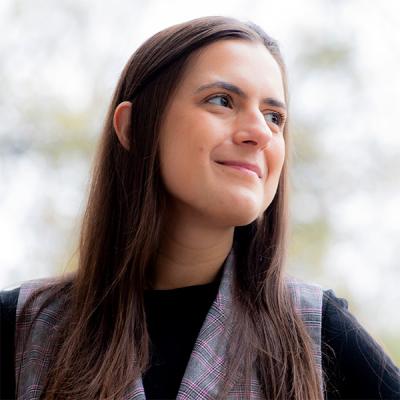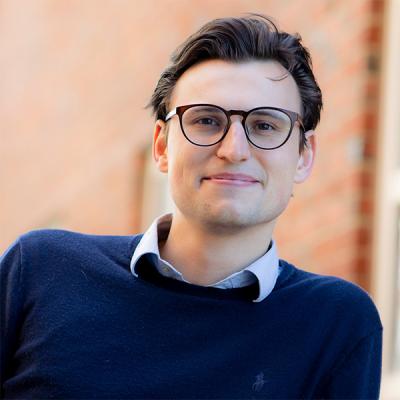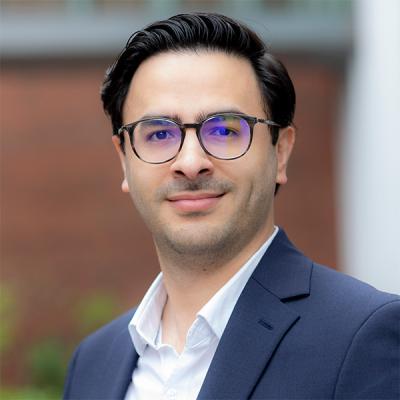Highlights of My Tuck MBA Experience
The core reason I chose to pursue an MBA was a desire to take more risks: to learn how to make the leaps of faith necessary to lead in ways that go beyond the expected. Prior to Tuck, I would describe myself as 80 percent thought and 20 percent action. But through my MBA, I’ve become more decisive and more experimental: I’ve gained the confidence to bring my ideas into reality.
Coming to Tuck from a government background, I also wanted to test a hypothesis: that not only can business work to better society, but in fact business support is an integral part of solving global problems. I came to Tuck to develop a private-sector skill set that would help me better tackle the challenges I faced in public service; I left with both an expanded toolkit and a mandate to consider my own role in creating positive change as a business leader.
For me, the decision to choose Tuck came from both the head and the heart. On an intellectual level, I knew that, coming from a non-business background, I needed a program that would give me a strong conceptual foundation for business fundamentals while also incorporating an experiential element to help me internalize the lessons learned. Tuck’s combination of a vigorous core curriculum and many experiential learning options (including through the Centers) was the fast-track to learning I needed. But on an emotional level, I fell in love with Tuck’s close-knit and supportive community. A self-described introvert, in choosing an MBA I committed to overcoming shyness and developing my networking skills. I knew that to feel comfortable taking more risks, I needed mentors, advisors, professors, and friends who I could be vulnerable with.
A few memorable experiences while at Tuck include co-chairing Tuck Talks, an event where students, partners, staff, and faculty gather to share the stories that have shaped their lives with the Tuck Community. This was a formative experience for me. Tuck Talks as an event is only possible through the high level of respect and trust that Tuckies have for one another. Being a Tuck Talks co-chair has taught me so much about both my classmates and about the amazing environment of vulnerability and empathy that exists because of Tuck’s unique culture.
I’ll come out and say it: I had the best Tuck First-Year Project ever! Getting to work on an entrepreneurial FYP with a startup focused on 3D printing miniature figurines for Dungeons & Dragons games is an experience I’d never get anywhere else. Business leaders constantly emphasize the need for hypothesis-driven thinking and a “fail fast, fail cheap” mentality—having to design and build a business model while facing all the constraints of a real startup during EFYP is how you actually develop these skills.
Academically, Tuck offers students a rock-solid core foundation of understanding on business fundamentals combined with innumerable experiential opportunities tailored to your goals and interests. I came to Tuck with essentially zero knowledge of accounting, corporate finance, or operations, but I will leave knowing the right questions to ask practitioners in any of them. Meanwhile, my experiences as a fellow with the Center for Digital Strategies and the Center for Business, Government & Society allowed me to home in on my passions for technology and financial inclusion, interests that I’ll be pursuing in my post-Tuck work at Capital One.
In my mind, the key differentiators are how invested the entire Tuck community is in ensuring your success, and how support here is offered proactively vs. reactively. For example, my career advisor reached out to schedule a conversation about my recruiting goals in June of my first year, before the term had even started! At Tuck, you’ll never be a “face in the crowd”: your career advisors, professors, classmates, and alumni mentors all take the time to get to know you as an individual. I’m especially awed by the willingness of Tuck alumni to go above and beyond to help current students.
As someone who grew up in Northern New England, coming to Tuck felt like a homecoming for me. One of my favorite Tuck outdoor memories was ice skating with friends on Lake Morey this winter. Another highlight was learning to cross country ski. Overall, I think Tuck’s intimate setting encourages students to fully immerse themselves in the experience, both academically and personally.
What you get out of Tuck depends on what you put in: In other words, the better you understand what excites and motivates you personally, the easier it will be to make decisions that maximize your long-term happiness, whether that’s while applying to business school or attending an MBA program. The most challenging part of the Tuck experience is choosing which opportunities to prioritize—the most valuable thing you can spend is your time. It’s easy to substitute commonly-held perceptions of what’s valuable for what truly matters to you as an individual, which is why spending time on reflection is so important.



